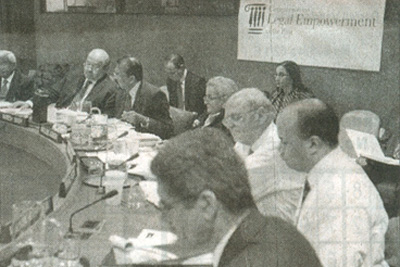
| 13/07/2008 - Sunday Island | |||
Final Report of the Commission on the Legal Empowerment of the Poor |
|||
 |
|||
|
|||
The High Level commission on Legal Empowerment of the Poor – an independent, global initiative – set out three years ago by United Nations Development Programme to explore how nations can reduce poverty through reforms that expand access to legal protection and opportunities for all. The Commission’s unique mission was built on the conviction that poverty can only be eradicated if governments give all citizens, especially the poor, a legitimate stake in the economy by extending, the rule of law, making access to users’ and property rights and other legal protections, not the privilege of the few, but the right of all citizens. Co-chaired by former U.S. Secretary of State, Madeleine K. Albright, and renown Peruvian economist, Hernando de Soto, the Commission is comprised of 21 Commissioners and 16 Advisory Board members, including former heads of state and government, cabinet ministers, jurists, economic researchers, and other senior policymakers from the North, South, East and West. Members of the Commission included Gordon Brown (who resigned after becoming the Prime Minister of Great Britain); Madeleine K. Albright, former U.S Secretary of State; Fernando Cardoso, former president of Brazil; Benjamin Mkapa, president of Tanzania; Ernesto Zedillo, former president of Mexico; Lawrence Summers, former President of Harvard University; and from Sri Lanka, Minister of Tourism and Member of Parliament, Milinda Moragoda. Over three years, the Commission conducted 22 national consultation processes with representatives from local governments, academia, civil society and grassroots movements, and launched five technical working groups, which submitted specialized reports. The Final Report of the Commission, entitled Making the Law Work for Everyone, was recently released to the public and is now available on the Commission’s website. The report called on governments, international institutions and civil society to make legal empowerment a top agenda item in the fight against global poverty. As the global food crisis wreaks havoc on nations across the globe, this timely report proposes solutions that focus on the core of the problem of poverty. In the foreword of the report, British Prime Minister and former Commission member, Gordon Brown, observed that: “Three years ago, a distinguished group of scholars, former heads of state, senior policy makers and thinkers came together to explore the issue of legal empowerment of the poor. I want to applaud my former colleagues’ final product. I agree with the overall finding that by expanding and deepening universal legal protection, poor people will be better able to free themselves from poverty. As the Report highlights, the sources of legal exclusion are numerous and very often country-specific… The Report will stimulate debate and discussions that have a profound bearing on progress towards achieving the Millennium Development Goals. Concretely we are more than halfway from 2000 to 2015. Yet, in reality we are still a million miles away from success…” The ground-breaking report finds that half of the people living in urban areas worldwide inhabit squatter settlements and work in the informal economy. Even larger numbers live in isolated rural areas with limited secure access to land and other resources. These people often operate outside the law by entering into informal labour contracts, running unregistered businesses and occupy land to which they have no formal rights. In many countries the percentage of unregistered homes and businesses is over 80 percent, and the informal economy accounts for over a third of the developing world’s economy. Legal empowerment can reenergize the human rights agenda and drive advances that would otherwise be out of reach. The Commission’s report concedes that, “making poverty history cannot be accomplished through Legal Empowerment alone, but it is hard to see how it can be done without it.” The Legal Empowerment agenda focuses on improving the internal dynamics of countries. By improving these internal dynamics and frameworks, the Commission’s work serves as a complement to existing international aid efforts. Taken together, the legal empowerment agenda can assist nations in transforming debt forgiveness and aid into a realization of the Millennium Development Goals. The final report can be found on the Commission’s web site: undp.org/legalempowerment. |
|||